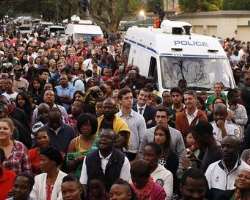Song, dance and tears for Mandela

South Africans of all colours erupted in song, dance and tears in emotional celebrations of the life of the man who bridged their country’s black-white divide and helped avert a race war.
A day after Nelson Mandela‘s death at 95, hundreds gathered outside the home where Mr Mandela lived as a young lawyer in the rough and tumble Soweto township.
“I don’t think Mr Mandela belonged to black people,” said Alex Freilingsdorf, a Toyota executive at a Soweto dealership. “He belonged to South Africa.”
The mood was simultaneously celebratory and somber at the impromptu street festival where Themba Radebe, 60, filmed scenes to share with his family.
“I’m sorry, I’m too emotional. The tears flow too easily,” he said, his eyes filling with tears as he reflected on how South Africa’s race relations have improved – “not perfect, but much better” – compared with his childhood in the black township.
“This is a celebration of the death, because we knew he was an old man,” Mr Radebe said. “He brought a lot of changes to our community, because I grew up in apartheid. It was a very bad situation.”
At a service in Cape Town, Archbishop Desmond Tutu, a Nobel laureate like Mr Mandela and himself a monumental figure in the struggle against apartheid, called on South Africa’s 51 million people to embrace the values of unity and democracy that Mandela embodied.
“God, thank you for the gift of Madiba,” he said, using Mr Mandela’s clan name.
“All of us here in many ways amazed the world, a world that was expecting us to be devastated by a racial conflagration,” Archbishop Tutu said as he recalled how Mr Mandela helped unite South Africa as it dismantled the cruel system of white minority rule, and prepared for all-race elections in 1994.
In those elections, Mr Mandela, who spent 27 years in prison, became South Africa’s first black president.
At his home in the leafy Johannesburg neighbuorhood of Houghton, where he spent his last sickly months, a multi-racial crowd paid tribute.
“What I liked most about Mandela was his forgiveness, his passion, his diversity, the impact of what he did,” said Ariel Sobel, a white man who was born in 1993, a year before Mr Mandela was elected president.
